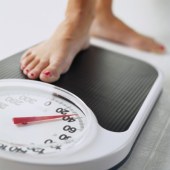Weight Loss
By Lisa Rapaport (Reuters Health) – Cancer patients under age 65 are much more likely than older people to explore alternative and complementary medicine for easing their symptoms and side effects of treatment, a new study suggests. “We found that the baby boomers are much more likely to use complimentary and alternative therapies than their parents in part due to a social change in the U.S. in the 60s and 70s with a big social movement toward things like a macrobiotic diet and yoga that made these things more mainstream,” said senior study author Dr. Jun Mao, director of integrated oncology at the Abramson Cancer Center at the University of Pennsylvania in Philadelphia. Mao and colleagues surveyed adults with breast, lung and gastrointestinal tumors who were treated at the cancer center between June 2010 and September 2011.
Children with diarrhea misdiagnosed more often if weight is sole criterionAdam C. Levine, M.D.
Who remembers Carnation Instant Breakfast? You just needed to add milk or water to these nutritious, artificially-flavored, sugar-laden meals-in-a-packet. My mother drank them before she took off for work. I drank them before I took off for school. We both tolerated the taste in the spirit of fast, nutritious and calorie conscious consumption….
 Teenagers who are very overweight may run double the risk of developing colorectal cancer when they reach middle age, according to research published Monday. At the time of conscription, around 12 percent of the men were underweight, more than 80 percent were of normal weight and five percent were moderately overweight. Of the remainder, 1.5 percent were very overweight — with a body mass index of between 27 and nearly 30 — and one percent were obese, with a BMI of more than 30.
Teenagers who are very overweight may run double the risk of developing colorectal cancer when they reach middle age, according to research published Monday. At the time of conscription, around 12 percent of the men were underweight, more than 80 percent were of normal weight and five percent were moderately overweight. Of the remainder, 1.5 percent were very overweight — with a body mass index of between 27 and nearly 30 — and one percent were obese, with a BMI of more than 30.

 By David Lawder WASHINGTON (Reuters) – General Electric Co would lose a $350-million deal to build locomotives for Angola, and perhaps billions of dollars more in future export opportunities, if Congress closes the U.S. Export-Import Bank, a senior GE executive told Reuters. “It would be gone,” GE Transportation unit president Russell Stokes said of a not-yet-finalized agreement announced by the global conglomerate in March for 100 lightweight diesel-electric locomotives to be built in Erie, Pennsylvania. Up to 1,800 jobs at GE, its suppliers and local businesses in 12 states would be put at risk because, without Ex-Im financing, Angola would buy Chinese-built locomotives, he said.
By David Lawder WASHINGTON (Reuters) – General Electric Co would lose a $350-million deal to build locomotives for Angola, and perhaps billions of dollars more in future export opportunities, if Congress closes the U.S. Export-Import Bank, a senior GE executive told Reuters. “It would be gone,” GE Transportation unit president Russell Stokes said of a not-yet-finalized agreement announced by the global conglomerate in March for 100 lightweight diesel-electric locomotives to be built in Erie, Pennsylvania. Up to 1,800 jobs at GE, its suppliers and local businesses in 12 states would be put at risk because, without Ex-Im financing, Angola would buy Chinese-built locomotives, he said.
By Kate Kelland LONDON (Reuters) – Victims of childhood bullying are more likely to be overweight or obese as adults and have a higher risk of developing heart disease, diabetes and other illnesses, according to a study by British psychiatrists. Researchers found that just over a quarter of women who were occasionally or frequently bullied as children were obese at age 45, compared to 19 percent of those who had never been bullied. “Bullying is bad for your physical health, whether you’re a man or a woman,” said Andrea Danese, who worked on the study at the Institute of Psychiatry, Psychology & Neuroscience at King’s College London.
 By David Lawder WASHINGTON (Reuters) – General Electric Co would lose a $350-million deal to build locomotives for Angola, and perhaps billions of dollars more in future export opportunities, if Congress closes the U.S. Export-Import Bank, a senior GE executive told Reuters. “It would be gone,” GE Transportation unit president Russell Stokes said of a not-yet-finalized agreement announced by the global conglomerate in March for 100 lightweight diesel-electric locomotives to be built in Erie, Pennsylvania. Up to 1,800 jobs at GE, its suppliers and local businesses in 12 states would be put at risk because, without Ex-Im financing, Angola would buy Chinese-built locomotives, he said.
By David Lawder WASHINGTON (Reuters) – General Electric Co would lose a $350-million deal to build locomotives for Angola, and perhaps billions of dollars more in future export opportunities, if Congress closes the U.S. Export-Import Bank, a senior GE executive told Reuters. “It would be gone,” GE Transportation unit president Russell Stokes said of a not-yet-finalized agreement announced by the global conglomerate in March for 100 lightweight diesel-electric locomotives to be built in Erie, Pennsylvania. Up to 1,800 jobs at GE, its suppliers and local businesses in 12 states would be put at risk because, without Ex-Im financing, Angola would buy Chinese-built locomotives, he said.
By Lisa Rapaport (Reuters Health) – When humans invented the wheel and domesticated horses thousands of years ago, enabling a transition from hunting and gathering to farming, they also started developing weaker bones that make modern people more susceptible to fractures and osteoporosis, according to a new study. Scientists analyzed the remains of Europeans who lived at various times over the past 33,000 years and found the more stationary lifestyle afforded by farming – not the rise of cities or changes in diet – appears to have led to thinner, more brittle bones in modern humans, compared to our “caveman” ancestors. “There was a lot of evidence that earlier humans had stronger bones and that weight-bearing exercise in modern humans prevents bone loss, but we didn’t know if the shift to weaker bones was driven by the rise in agriculture, or by other causes like diet or urbanization,” said Dr. Christopher Ruff, director of the Center for Functional Anatomy and Evolution at Johns Hopkins Medical Center in Baltimore who led the study published May 18 in the Proceedings of the National Academy of Sciences.
 A study from the University of Wisconsin School of Medicine and Public Health has found that while it may not be easy, getting at least seven hours of sleep a day could lessen the negative health consequences for those who do shifts outside the 9-to-5 schedule. Using 2008-2012 data from the Survey of the Health of Wisconsin, researchers found that shift workers were significantly more likely to be overweight (47.9% vs. 34.7% for traditional schedule workers). They also had more sleep problems, including insomnia (23.6% vs. 16.3%) and insufficient sleep (53.0% vs. 42.9%). Led by Dr. Marjory Givens, the team found sleep problems to be positively associated with being overweight/obese or diabetic, and they found that the association between shiftwork and being overweight or diabetic was stronger when shiftworkers got insufficient sleep (less than seven hours per day).
A study from the University of Wisconsin School of Medicine and Public Health has found that while it may not be easy, getting at least seven hours of sleep a day could lessen the negative health consequences for those who do shifts outside the 9-to-5 schedule. Using 2008-2012 data from the Survey of the Health of Wisconsin, researchers found that shift workers were significantly more likely to be overweight (47.9% vs. 34.7% for traditional schedule workers). They also had more sleep problems, including insomnia (23.6% vs. 16.3%) and insufficient sleep (53.0% vs. 42.9%). Led by Dr. Marjory Givens, the team found sleep problems to be positively associated with being overweight/obese or diabetic, and they found that the association between shiftwork and being overweight or diabetic was stronger when shiftworkers got insufficient sleep (less than seven hours per day).





